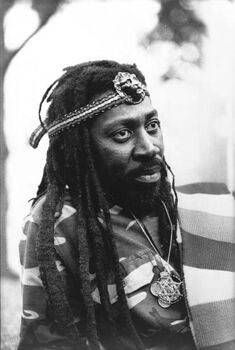Calisto Cruz
This article is incomplete because it is pending further input from participants, or it is a work-in-progress by one author. Please comment on this article's talk page to share your input, comments and questions. Note: To contribute to this article, you may need to seek help from the author(s) of this page. |
Calisto Cruz | |
|---|---|
 Cruz in 1980 | |
| Background information | |
| Birth name | Calisto Minero Cruz |
| Also known as | C.M.C., Cruz and his Minaret Band, Cruz and his Brass Band |
| Born | December 13, 1953 Porto Leste, Maracao |
| Genres | Primary: Estranova, jazz, reggaeton, ska Secondary: Blues, bossa nova, MPB, R&B, samba, samba-canção, surf rock, tropicália |
| Instruments | Saxophone, trombone, trumpet |
| Years active | 1974–present |
| Associated acts | |
| Head of the Ministry of Culture of the Presidium of the Revolutionary Congress | |
| Assumed office March 18, 2009 | |
| President | Adão Costa |
| Preceded by | Francisco Rego |
Calisto Cruz (born Calisto Minero Cruz on December 13, 1953; aged 67, Maracan Iustian: [kali's:tɐ kʁus]) is a Maracan saxophonist, trombonist, trumpeter and singer. Active during the 1970s, his contributions to genres such as estranova, ska and reggae, as well as international genres such as blues, surf rock and R&B have garnered him an extremely influential reputation in the Iustophone world, and his contributions to music are held as some of the most important in modern music.
Cruz played in the brass section of his local school's orchestra from a child, becoming an incredibly gifted instrumentalist evident from a young age. As a teenager, he began to create some of his own works, but it was not until 1974, aged 21, that Cruz began his professional musical career. With his first album, Não iria embora, Cruz cemented himself as one of Maracao's most proficient instrumentalists. His second album, self-titled Calisto Cruz, was released under the moniker of Calisto Cruz and his Minaret Band, and pushed the boundaries of estranova at the time, incorporating northern influences such as blues and traditional jazz as well as Belmontese influences like samba and bossa nova to create what is now revered as a pioneering record for estranova futuro.
Cruz continued to mix and fuse genres together in his subsequent releases 2ª Cruz (1980), Arquipélagologia (1983) and Pão do Cego (1985), which increasingly took a more political and philosophical tone. Cruz stopped releasing studio albums in 1985, but continued to tour, do live shows, and make features on other albums. On top of this, Cruz began to pursue a political career. In 2000, he joined Maracao's ruling Frente Revolucionária de Libertação, and became an incredibly influential cultural spokesperson for the party. Adão Costa appointed Cruz to the Presidium of the Revolutionary Congress in 2009 as Head of the Ministry of Culture, a role historically filled by icons of Maracan culture.
Early life
Musical career
Early career: 1970–1974
Não iria embora, Calisto Cruz and domestic breakthrough: 1974–1977
2ª Cruz and increasing foreign influence: 1977–1982
Arquipélagologia and Pão do Cego: 1982–1985
Post-studio career: 1985–present
Political career
Politics in music
Early party member
Member of the Presidium
Cultural impact and legacy
Discography
- 1974: Não iria embora
- 1976: Calisto Cruz
- 1977: Cruz & Vasconcelos (with Osvaldo Vasconcelos)
- 1979: Cruz & Cordeira (with Gervásio Cordeira)
- 1980: 2ª Cruz
- 1981: Cruz, Duarte & Nkosi (with Francisco Duarte and Gil Nkosi)
- 1983: Arquipélagologia
- 1985: Pão do Cego